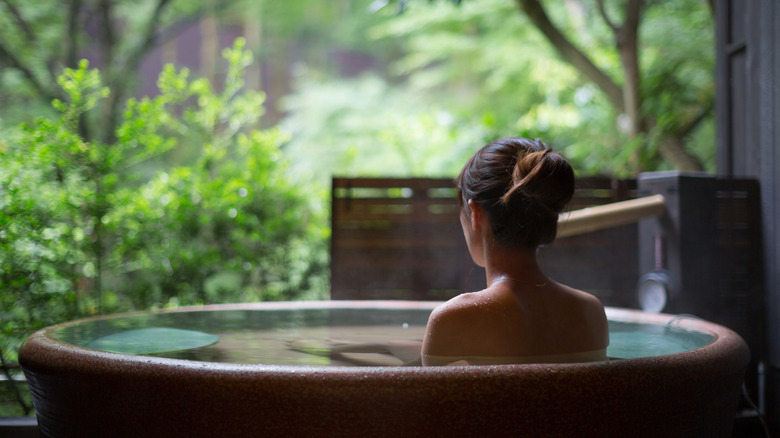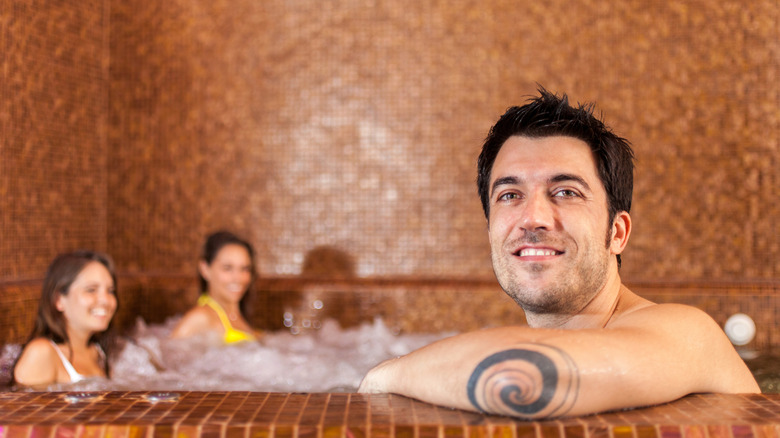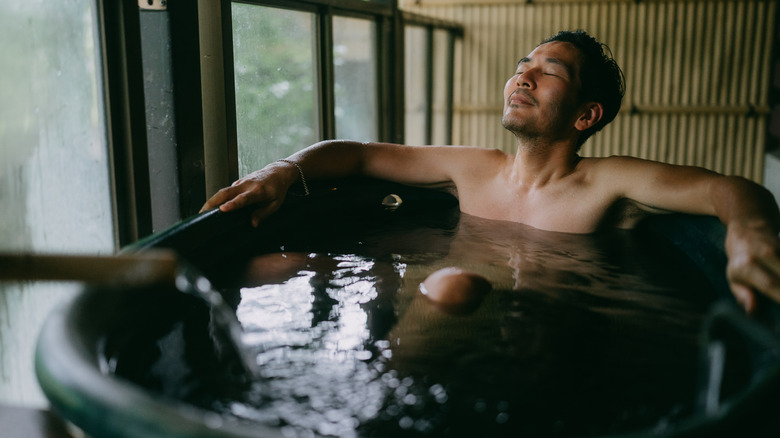Why People With Tattoos Might Be Turned Away At Traditional Japanese Spots
Onsen culture is an intrinsic part of Japanese life, with over 2,300 of these natural hot springs facilities across the country. With more geothermal sources than any country in the world, every region in Japan has its share of onsens. They are considered the ultimate form of relaxation, almost like a type of therapy. They're also very diverse in terms of offerings, coming in many different varieties, including outdoor, indoor, traditional, and modern –– sometimes distinguished by the minerals dissolved in their waters. This age-old Japanese tradition relaxes the body and mind, and the minerals used provide health benefits to bathers. You'll find locals partaking in this tradition regularly.
Visiting an onsen is an essential part of any trip to Japan, however, visitors must also respect the local etiquette rules and never do certain things while visiting Japan. One rule may come as a surprise to many international travelers as well. Many onsens will not admit people with tattoos due to the cultural and historical significance in Japanese society.
Tattoos in Japan have a complicated history
Tattoos in Japan have long been associated with outlaws. This is because during the Edo period, from 1603 to 1868, tattoos were used as a form of punishment for criminals. The stigma associated with tattoos evolved, and eventually, the punitive tattooing was replaced. But tattoos began to take on a new meaning as well. Later, during the Meiji period, tattoos were banned outright as global cultural perceptions of Japan were shifting. To avoid certain stereotypes about Japan around the world, the government decided to outlaw decorative tattoos in 1872. This merely led Yakuza members to adorn themselves in this way as an act of rebellion against the government. Organized crime syndicates would often adopt certain visual symbols to show loyalty to their group, but this merely strengthened the existing negative connotations surrounding tattoos amongst the general Japanese population.
The ban on tattoos was lifted in 1948, after World War II. Cultural perceptions around tattoos are changing and they now have come to be understood as creative self-expression, but you may still encounter some prejudice –– especially amongst the older generations whose perspectives remain rooted in the old traditions and customs.
Cultural perceptions of tattoos have changed over time
For those with tattoos who don't want to miss the opportunity to partake in this intrinsic Japanese tradition, it is recommended that you check with each onsen in advance. A quick email or call may save you hassle and disappointment on the day. You may not be granted entry into some onsens if you have visible tattoos. Some onsens will also sell "tattoo seals" which are skin-colored adhesive patches that you can use to disguise small to medium size tattoos. You can also bring your own in advance as you may not always find them on sale at the bathing houses. Alternatively, you can also book a private "kashikiri buro" onsen, which is perfect for individuals or small groups. These private bath "suites" give you the privacy and exclusivity of having access to your own hot spring, and also mean that there will be no prejudiced onlookers judging you during your bathing experience.
Tattoo-friendly onsens exist as well. Though they are few and far between, you will find a small number of these havens throughout the country. These bath houses are unmissable tourist destinations in Japan, and onsens such as Matsumoto-yu and Koganeyu cater to tattooed clients. With this in mind, make sure to adhere to other onsen rules. For instance, photography is usually prohibited and most onsens will require you to strip entirely nude to enter. Onsens are not for swimming but for relaxation and it is for this reason that you must also be conscious of the noise you produce. This country's society is one built on strict customs and traditions, so if you are a considerate tourist in Japan, you are sure to have a more fulfilling time.


